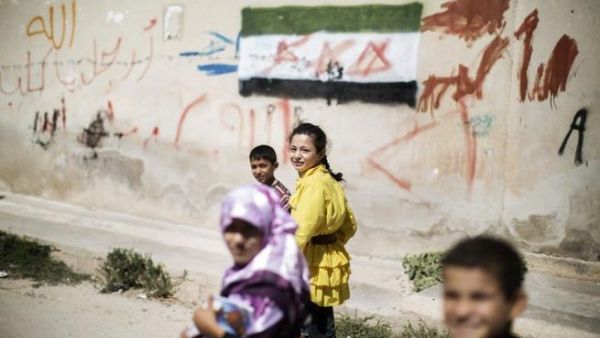Sunday marked the first day of the new school year in Syria. But Abu Mustafa, like countless refugee parents across the country, will not be able to send his three children to school this year.
“I spent a great deal of effort in my desperate attempts to convince the school’s director to register my children before the beginning of the school year,” said Abu Mustafa, who fled his village near Homs to escape the fighting.
“I could not get their school records [because] their old school was burned to the ground,” he explained. “To get an alternative copy, I have to go to the Directorate of Education in Homs.”
“Of course, this is impossible today,” he added.
Families across Syria face similar bureaucratic obstacles, to say nothing of the many children who have been killed or injured since the crisis began in March 2011.
Many families fled to a different area of the country and are now unable to go home to pick up their children’s school records, without which they cannot register for a new school.Many families, like that of Abu Mustafa, fled to a different area of the country and are now unable to go home to pick up their children’s school records, without which they cannot register for a new school. Others have had their records destroyed completely when their schools were damaged. Official statistics provided by the Syrian education ministry indicate that more than 2,000 public schools are either partially or fully damaged due to the fighting across the country.
Moreover, around 800 schools are being used as shelters for refugees. Education authorities have issued orders to evacuate refugees from those buildings but face a dearth of alternative housing options.
Some of the suggested locations include sports halls, Baath Party offices and youth training camps.
Recently, the education ministry issued a number of additional instructions applying to teachers living in areas that are witnessing military clashes, or those who have to travel long distances.
Due to their “humanitarian situation,” the ministry promised to transfer teachers to schools closer to their residences. According to ministry statements, priority will be given to “families of martyrs, married female teachers, unmarried female teachers, and then teachers who have spent their five year service in rural and remote areas, according to the education law in Syria.”
The ministry has also lifted the official school uniform requirement due to the security situation.
Those students who were lucky enough to be able to register found that their first day of school was spent like much of their summer vacation, in a state of constant fear.
The security situation has forced many parents to accompany their children to school in the morning and pick them up again at noon.
Nizar, a government employee, left his post to join dozens of parents at the gates of a school in Damascus, waiting for his children.
“Its a new task which I split with my wife, who is also employed,” he said. “She chose to take our four children to school in the morning and I have to bring them back home at noon.”
“I cannot stand the idea of security concerns near my children’s school while I am away,” he continued.
Students who will be sitting for their preparatory and secondary certificate exams usually prefer to enroll in the capital’s schools which have a better teaching staff than in the rural areas. This year, they face the additional obstacle of checkpoints.
Mufid, a final-year student at a school near the al-Baramkeh neighborhood in Damascus, was stopped for three hours at a checkpoint near the Mazzeh military airport.
“When I reached my school, the third period was about to finish...One roadblock will force me to leave home at five in the morning to be able to get to school a few minutes before classes begin,” he complained.
The long wait at the security checkpoints has also affected teachers in schools around the capital, who return to school a week before the students to prepare.
Hiyam, a teacher in Damascus, said she must pass through 11 security checkpoints to get to work. She wastes a total of five hours every day on her way to and from her school.
But despite the ongoing violence and new security measures, student bookstores in al-Halbouni neighborhood and al-Maskieh market, part of the popular and historical Souk al-Hamidiyeh, looked as busy as usual.
But shop owners expressed disappointment with the turnout.
“Sales did not reach one quarter of what they were before the events,” Abu Hassan, a stationary shop owner in al-Maskiyeh, told Al Akhbar.
“Owners of bookshops in rural and remote areas purchase their goods wholesale from my shop every year,” he added. “Even their demand dropped to less than one half.”
What will this mean for the children of Syria? And, how will this gap in education affect the future of the conflict-ridden country? Leave us your thoughts below!








